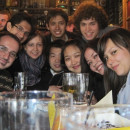My Body is in America, My Heart is Still in Paris Past Review
By Brittany S (International Business/Marketing, University of Arkansas - Fayetteville) for
WorldStrides Study Abroad in Paris, France
My study abroad experience was extremely worthwhile. I wouldn't trade it for anything. I learned so much about myself as a person and how I react to other people who are not anything like me (Americans and foreigners alike). I learned how to deal with difficult situations on my own where I'm outside my comfort zone (being shy speaking the language, figuring out the post office, the transportation system, etc). I also am very open-minded now about other cultures and people. I can say I've grown to love learning about other cultures and I'm proud and appreciative to have friends from all over the world. I've always thought it would be cool to live in Paris since I first started studying French in high school, but now I can say with confidence that I want/plan to live and work in Paris.
Review Photos




Review Your Program
|
* Overall educational experience
Academic rigor, intensity, resources, etc. |
I cannot express in words how grateful I am that I got to go to this school and participate in this program. My French comprehension/speaking/writing skills improved drastically because at La Sorbonne, all classes are taught in French and your classmates are from all over the world, meaning the common language is French, not English, so even when talking to them you must speak French. Also, my main "practical course" teacher, Mme Henaut, was absolutely amazing. She was so helpful and nice and easy to learn from. She was great at explaining things in various ways using various French words so everyone could comprehend what she was teaching. I loved going to that class every single day, which is saying a lot because it was a 2-hour class five days a week! Every professor at the university is a French native, which is so helpful for learning how to pronounce things properly, comprehending their accent, and phrasing things the way the French do. Students also have a phonetics class one hour every day for a week, every-other week. This class was dry, but worth it. You can really see your pronunciation skills improve. You also have to take between 2 and 4 elective lecture courses. These meet once a week for 2 hours each time. For example, I took a course on France and the EU on Wednesdays and one on Sustainability on Thursdays. Homework was only given in the "practical" course that met for 2 hours each day. The homework was optional but definitely beneficial for the final at the end, and we always self-graded it in class the next day. We also occasionally wrote in-class essays (all in French, of course) and those were turned in and graded by the professor, although as I said earlier, they weren't recorded. The grades were purely a way for you to see how you compare to the school's standards for your language level, and to help you prepare for the final where your compositions do matter. |
|
* Host Country Program Administration
On-site administration of your program |
I personally had no issues with the Paris administration. I found them very helpful, informative, accessible, and easy to talk to. They took us on tons of fun outings and we even got surprise "treats" sometimes on excursions (ex/ going to a wine tasting b/c we had extra time). I know some others in the program had issues with the program leaders, however this was not my experience. |
|
* Housing:
How satisfied were you with your living arrangements? |
Because I chose an apartment instead of a home-stay, I was not forced to speak French at home and therefore my housing specifically did not help my French skills. In this program, if you chose an apt, your roommates are Americans. We never spoke French with each other except when doing homework. I loved my apartment, my only complaint was about one of my roommates who was extremely messy and never did her share of the cleaning, which was disgusting. But that was just an unfortunate coincidence. My neighborhood was extremely safe; mostly families lived in the area except in our apt building which housed lots of ISA students. From my apt, it took about 30 minutes to get to class by metro, but that's extremely typical in Paris. Nightlife was just a few metro stops over. The apt came furnished and with dishes/cookware, although there were a few choice items my roommates and I decided to purchase for our own comfort. |
| * Food: |
If there's one thing Paris is full of, it's restaurants. If you ever get sick of eating what your host family cooks or what you have in your pantry, you can always go out to eat. France is known for it's amazing food. Things are different, but easy to adjust to from American food. I personally fell in love with a certain kind of cereal and ate it every single day for breakfast. I also found these amazing packaged chocolate waffles in the grocery store, and I ate at least one a day. If I find a food I love, I prefer to eat that everyday. However, if you like variety, there's plenty of that too. If you ever find yourself missing American foods, there are American restaurants in Paris (one absolutely amazing one is called Breakfast in America where the menus are in English and they serve bacon, sausage, pancakes with syrup, eggs, biscuits...you name it). |
|
* Social & Cultural Integration:
How integrated did you feel with the local culture? |
Two great weekend excursions to Normandy/Mont St. Michel and the Loire Valley, day trips to different museums, Versailles, the comedy show "How To Become Parisian in One Hour" (absolutely a must-see!), exhibits around the city, the catacombs, etc. All of these things were optional, but all of it was covered by the program price, so you might as well go. Plus it was all awesome! In addition, ISA put together a spring break trip to Morocco!!! It was a 5-day trip, two of the program leaders led it and 30 students went on it. This was not included in the price; it cost 650 Euro, all-inclusive (and I mean all, except souvenirs). This was the trip of a lifetime. I'm so glad I decided to go. We spent two days in the Sahara Desert, sleeping in tents, riding camels, dune-boarding, and visiting the nearby village. We also spent a day in the Medina in Fez and toured some other major cities. All the events/excursions were amazing. |
|
* Health Care:
How well were health issues addressed during the program? |
|
| * Safety: |
We didn't have any problems. Paris is a safe city with a few exceptions, and as long as you stay away from those areas or have other people with you while you're in those areas, you'll be fine. One of my roommates did chip her tooth while over there. Thanks to the healthcare system France has, she got it fixed the very next day for only 50 Euros, which was reimbursed to her when she went through customs to get back to the US. |
| If you could do it all over again would you choose the same program? |
Yes
|
Finances
|
* Money: How easily were you able to live on a student's budget?
(1 = not very easy/$200+ on food & personal expenses/week, 2.5 = $100/week, 5 = very easily/minimal cost) |
|
| Not including program expenses, about how much money did you spend on food and other expenses each week? | I spent about 15 Euro a week on food. This was at the grocery store, not restaurants. If you choose a home-stay, meals are included in the program price, so you don't have to spend extra money on food. I shopped a lot, so I probably spent 200-250 a month on personal expenses (clothes, shoes, purses). To me it was worth it, but if you're not a huge shopper or dying for Paris fashions, you can spend a lot less than that. I did laundry every 2 weeks, which cost about 9 Euros each time. Your Navigo (metro pass) will cost about 57 Euros each month, but it's unlimited and trust me, you'll want it. Once you average in travel expenses from spring break, weekend trips, etc, your average weekly spending will obviously be a lot higher (mine was about 250 Euros/week once everything was averaged from my entire trip). But as far as a normal week, you'll probably spend 100 Euros or less. |
| Do you have any general money-saving tips for future study abroad participants? | My spending advice would be to use your money how you want. You're living in a foreign country with opportunities to buy/experience things you might not get to in America. Have fun. Buy what you want. Be stingy later when you return home. Another tip: if you're there for a semester or year, keep in mind that that's a long time and there's no need to convert everything you buy from Euros to dollars. You're living there, you're not a tourist who's there for one week, so act like you live there. Something you should be aware of: Paris is THE most expensive city in the world right now. |
Language
| * Did your program have a foreign language component? | Yes |
| How would you rate your language skills at the beginning of the program? | Intermediate |
| What was the highest level language course you had completed prior to departure? | 4000 (senior) level |
| If applicable, to what degree did your living situation aid your language acquisition? |
|
| Language acquisition improvement? |
All my classes were in French, so improvement is unavoidable. The ISA program does have 2 other universities you can attend in Paris, Le Catho and ABS, at which I believe you can opt to take some of your classes in English instead of French. However, at La Sorbonne, all classes are in French, though at different levels. Outside of the classroom, I improved my language skills by going to happy hour at least once a week, right after class, with my Cours Practique classmates!! As mentioned before, they were mostly foreigners (I was 1 of 3 Americans in my class) so being friends with them forced me to speak French (even though a few could also speak English). I absolutely recommend this to anyone as a means of improvement. We talked about everything from our countries to families to education to dating to future goals, and we were able to express it all in French. Over the 4 months we were there, our conversations became more complex and meaningful as we improved our speaking skills. In addition, I recommend doing the daily homework even though it is optional. I always did it and noticed a difference by the time 4 months had passed. Besides, the homework they assigned was not nearly as time-consuming as it is here, so there's still plenty of time for fun! You do need to use French in everyday interactions. Besides in the classroom, you use it in your home-stay (if you choose to live in one), in the grocery store, the post office, clothing stores, book stores, restaurants, etc. You are LIVING in another country, don't forget that. It is okay if you don't speak perfect French; they don't expect you to. They do expect you to try and to improve as time passes. In Paris, you can almost always find someone who speaks English, but I would advise you not to depend on that if you intend on improving your language skills. The program leaders in Paris were all French but were fluent in English, so they are available if you need help/tutoring/etc. |
Other Program Information
|
* Where did you live?
Select all that apply |
|
|
* Who did you live with?
Select all that apply |
|
|
* Who did you take classes with?
Select all that apply |
|
A Look Back
| * What do you know now that you wish you knew before going on this program? | If you want to improve your French skills, La Sorbonne is definitely the school to go to. The classes and professors are top-notch, and although intimidating, I would not have progressed as far as I did if the classes weren't totally in French. If you're even MORE set on improving, a home-stay is more beneficial than an apartment, but with an apartment you have more freedom. |
Individual Course Reviews
| Course Name/Rating: |
Cours Practique |
| Course Department: | |
| Instructor: | Mme Henaut |
| Instruction Language: | French |
| Comments: | Absolutely adored the professor and learned so much from her. She is a talented teacher and really cares about her students. I grew so much linguistically from this course. Also see what I wrote above for more info. |
| Credit Transfer Issues: | No, everything transferred perfectly because I got prior approval. This class met 10 hours a week and I got 9 hours of credit for FREN 4033 Oral Proficiency. |








